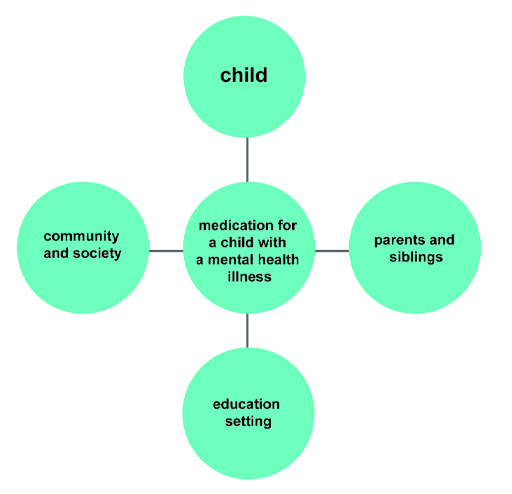5.1 The pros and cons of medication
There are of course pros and cons relating to the administration of drugs to manage symptoms of mental ill-health. Some medication is not prescribed, but are still ‘psychoactive drugs’ (i.e. is a chemical substance that changes brain function) nonetheless. For instance, when parents give their children ‘natural remedies’ such as St John’s wort, usually without any medical advice.
Activity 3 The advantages and disadvantages of medication for children with mental illness
Consider the pros and cons, or advantages and disadvantages, of prescribed medication when recommended by a medical doctor for a child who has been diagnosed with a mental health illness. Think about the possible advantages and disadvantages for the child, the family, their education setting.
Discussion
Here are some of the advantages and disadvantages of prescribing medication. You may have identified others.
The child
Advantages: Prescribing medication can help to address symptoms or features of a disorder and enhance a child’s functioning. For example, a child who has been diagnosed with attention deficit hyperactivity disorder (ADHD) after a comprehensive assessment across a range of environments, including their home and school, may find that medication, in particular Ritalin, can help to reduce their impulsive behaviour. Burton et al. (2014) illustrate this point by recounting their experience of working with children who report that an advantage of taking medication in this context is that it gives them ‘thinking time’ (p. 30), meaning that the medication can help increase their concentration. Increased concentration can help children to better engage with their education and learning.
Disadvantages: Not all medication works in the same way, and for some conditions efficacious medications are not available. Plus, we are all individual and dosage and personal preferences are important. Unfortunately, it is not uncommon for medications to cause side effects. This is why, prior to being prescribed a medical doctor will do a careful ‘cost-benefit analysis’ to determine whether the possible advantages (or benefits) clearly outweigh the costs (such as the side effects). Children who have been prescribed medication for ADHD may experience sleep problems, headaches and mood swings (National Health Service, n.d.). But without their medication they may struggle to function adequately, disrupting their learning and negatively impacting on their relationships with others.
When medication is having a positive impact there are also disadvantages. A compromise may be reached by introducing what Pavord et al. describe as treatment ‘holidays’ (2014, p. 30). This is where, for example, the child may take a break from medication when they are not at school.
Parents
Advantages: Having a child with a mental health condition can be distressing for parents and the whole family. The symptoms of a mental illness can have a profound impact on parents, who frequently blame themselves for their child’s diagnosis, which can be difficult for them to manage. Prescribing medication occurs infrequently with younger children, and should always be done when it is in the best interests of the child. Reducing symptoms and improving functioning as a result of medication can mean that parents will experience less pressure and in turn it makes parenting a ‘challenging child’ less difficult. Reducing the pressure on the family can help make a positive contribution to the wellbeing of parents and other siblings.
Disadvantages: Parents may find that medication, in particular the treatment adherence associated with it, becomes an added task which requires extra effort and time. This can include remembering to order the medication, administering it suitably, liaising with the child’s education setting and taking the child to review appointments. Some parents may have cultural or religious beliefs that mean they are reluctant for their child to receive medication, and many parents will be opposed to their child taking medication because they would prefer talk-based therapy.
Education
Advantages: If the medication assists the child, in terms of their functioning, this can mean that the child is able to more fully participate in their education setting. This has advantages for the child, and potentially for other children and for the staff.
Disadvantages: Staff may need to be aware of potential side effects of medication. Learning about this will require time to access training and to be able to liaise with parents. Some medication is formulated so that it can be given at home; however, this may not always be the case, therefore a medication policy will need to be written. Consideration will need to be given about the storage and administration of medication and who at the school is responsible for this.
Prescribing medication needs to be a joint decision, as far as possible. It is important to review the impact of the medication and to weigh up the pros and cons. Of course, not all medication is prescribed – ‘natural remedies’ purchased over the counter also carry risks, and there is limited evidence to support their effectiveness.

